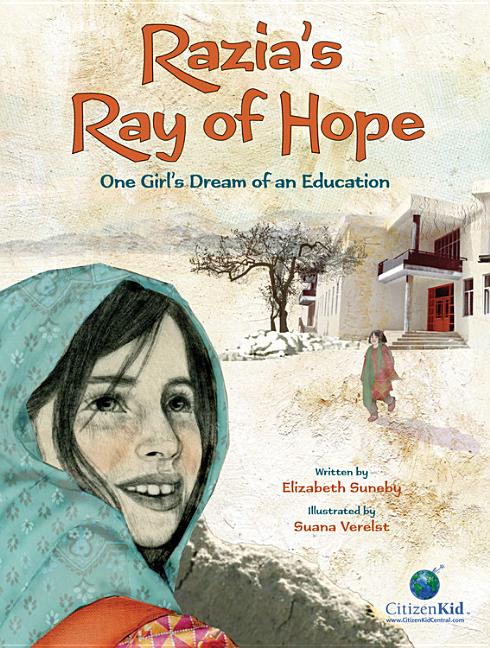Book Descriptions
for Razia's Ray of Hope by Elizabeth Suneby and Suana Verelst
From Cooperative Children's Book Center (CCBC)
Growing up in a small town north of Kabul in Afghanistan, Razia dreams of going to school, just as two of her brothers do. Her hopes soar when she learns that a new school for girls is being built in her town, and her grandfather agrees she should go to school. But most of the men in her family don't think that girls need an education. They want Razia to work in the family's orchard. Razia knows there's nothing she can do, but her curiosity takes her to the school once it is built and she meets the teacher, whose name is also Razia. The teacher pays a visit to Razia's home and convinces Razia's family to let her attend school. Although the story is fictional, the teacher is based on Razia Jan, a real person, and an afterword gives more information about this fascinating woman committed to educating girls. The illustrations, which combine painting and photo collage, use a style reminiscent of the work of Patricia Polacco. (Ages 6-9)
CCBC Choices 2014. © Cooperative Children's Book Center, Univ. of Wisconsin - Madison, 2014. Used with permission.
From the Publisher
Razia is excited when her grandfather tells her there's a school for girls being built in their Afghan village. At last, girls will have the same opportunity to be educated as boys. ?Every night I fell asleep dreaming about going to school like my brothers,? she says. Her grandfather wants Razia to enroll in the school. He remembers a time, before the wars and the Taliban, when educated women in Afghanistan became doctors, government workers and journalists, and how this made families and the country stronger. Razia knows, however, that she will need permission from her father and her oldest brother, Aziz, in order to be allowed to attend the school. She begs her grandfather, ?Please, Baba gi, ask Baba and Aziz if I may go. I must go.? But will her grandfather's words be enough to convince the younger men of the value of an education for Razia? Inspired by real-life Razia Jan's experiences when she built the Zabuli Education Center outside of Kabul, Afghanistan, author Elizabeth Suneby uses a fictionalized story to deftly personalize the plight of many children around the world who are not being educated. The layered, mixed-media illustrations by Suana Verelst add contextual details about life in an Afghan village. This book works perfectly for a social studies lesson on global cultures. Extra resources include an overview of children worldwide who do not attend school, the story of the real Razia Jan, a glossary of Dari words found in the text and activity suggestions.
Publisher description retrieved from Google Books.


